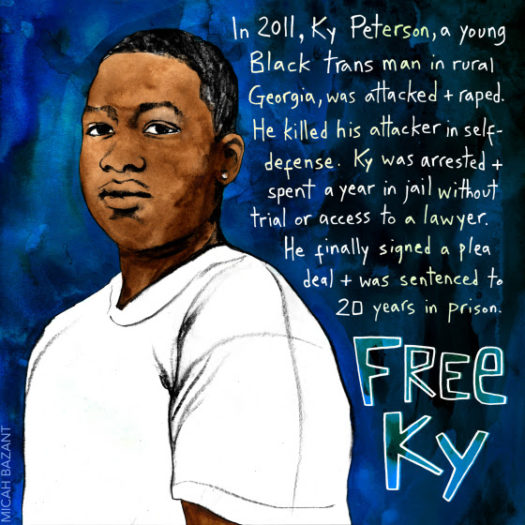#FreeKy #SurvivedAndPunished
Ky Peterson – Survived and Punished from BCRW Videos on Vimeo.
Ky Peterson should be free, but right now he is in prison for defending his life.
In 2011, on a fall evening in Americus, Georgia, Ky Peterson, a young Black trans man, was walking home from a convenience store when he was attacked and knocked unconscious. When he came to from the blows, he was being raped. Fearing for his life, Ky fought back. In the midst of the struggle, Ky shot his attacker, killing him.
Though he survived, Ky feared for his life again, knowing too well the police and criminal legal system’s brutal record on anti-Black racism, transphobia, and criminalizing survivors of sexual and physical violence. He was right.
Neither police nor prosecutors believed Ky was a victim.
Instead, he was charged with involuntary manslaughter with a twenty year sentence, fifteen of those years to be served in prison. Abused by the courts and neglected by the public defenders assigned to his case, Ky was coerced into signing a plea deal.
Ky’s community mobilized. They appealed to the court to reduce Ky’s sentence, which exceeded Georgia’s limits for involuntary manslaughter. Five years later, in 2017, Ky was granted a re-sentencing hearing, but the judge denied his request for parole. Instead, his sentence was changed from involuntary to voluntary manslaughter, providing the state of Georgia legal justification for the twenty-year sentence. In prison, Ky faces an isolation known for magnifying psychological torture and physical and sexual violence at the hands of corrections officers.
Ky has now been in prison for over five years with fifteen years left on his sentence. His community continues mobilizing in his defense.
Free Ky, Free Them All
Ky is not alone. Prisons are filled with survivors of physical and sexual violence, as well as survivors of state violence. Black and Brown people, immigrants, low-income and no-income people, women, queer and trans people, and people with disabilities are routinely criminalized for daily acts of survival.
Take Action: Community Self-Defense
We know from the successful campaigns to free Joan Little in the 1970s to the more recent campaign to free Marissa Alexander that grassroots mass mobilizations work. That’s why the Ky Peterson Defense Committee, including support from organizations Freedom Overground, Survived and Punished, Black and Pink, and Southerners on New Ground, are organizing to free Ky from prison.
NYC student activists are collaborating with Freedom Overground and Survived and Punished on a letter writing campaign to demand that Georgia Governor Nathan Deal pardon Ky and release him from prison.
If you live in New York City, you can join these activists at a letter writing party next Wednesday, August 16.
If you don’t live in NYC or you can’t make it next Wednesday, check out the Freeing Ky Support Guide from Freedom Overground to organize a letter writing party in your own community and learn about other ways to support Ky and others locked up in prison. You can also learn more by visiting the Freedom Overground website. Please use these resources and share them widely.
If you are on social media, you can help build momentum to support Ky’s freedom by posting a photo of yourself with a message of solidarity, using the hashtag #Justice4Ky and tagging @KyPeterson1 on Twitter and The Free Ky Project on Facebook.
Many people like Ky Peterson, Joan Little, and Marissa Alexander are in prison all over the United States, doing time for defending themselves and surviving.
Visit the Survived and Punished website to learn about ongoing campaigns for freedom and to support the work.
Download the Survived and Punished toolkit for resources on starting a defense campaign.

